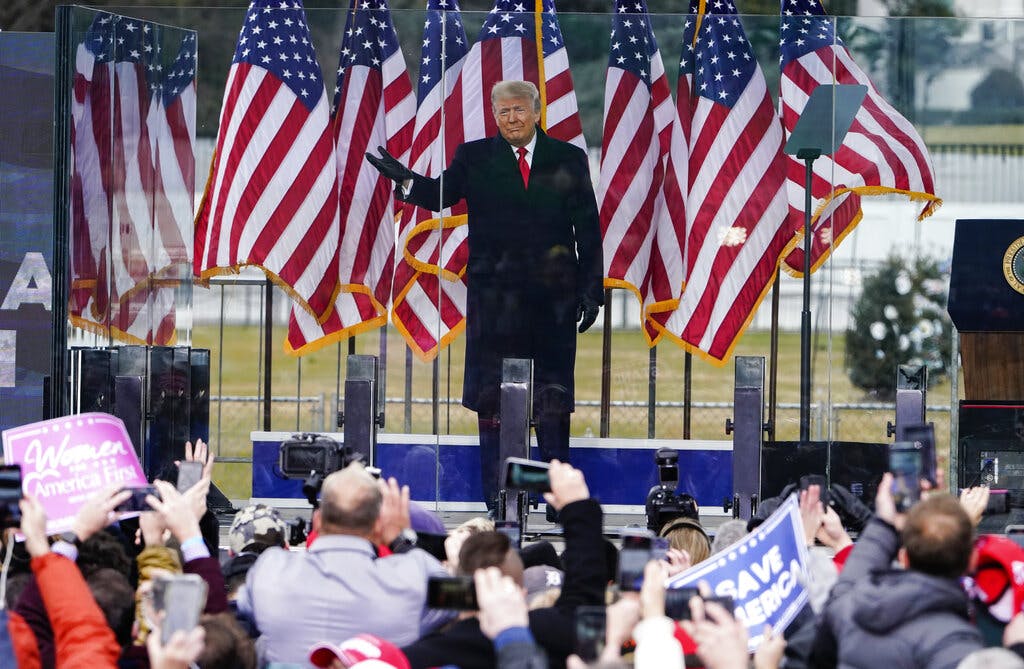President v. President: Biden’s DOJ Argues for Trump’s J6 Liability
An appellate brief seeks to protect the presidency but not the last president.

The argument from President Biden’s Department of Justice that President Trump does not enjoy civil immunity for the events of January 6, 2021, brings into focus the constitutional contours of the office both men have held, and could offer a preview for criminal contretemps still to come.
The amicus brief to the United States Court of Appeals for the District of Columbia comes in the case of Blassingame v. Trump, brought by a roster of Capitol Hill police officers and Democratic lawmakers who argue that Mr. Trump’s unlawful conduct on January 6 caused them to suffer physical and emotional injuries.
Mr. Trump responds that his actions on that day — primarily his speech at the Oval — transpired under the protective overhang of absolute immunity provided by the presidency. He points to Nixon v. Fitzgerald, which held that a “former President of the United States, is entitled to absolute immunity from damages liability predicated on his official acts.”
In the majority opinion in that case, Justice Lewis Powell attributed this grant of immunity to the president’s “unique position in the constitutional scheme” and said a commander-in-chief embroiled in lawsuits would pose “unique risks to the effective functioning of government.”
The federal district judge who heard the case, Amit Mehta, was not convinced, and ruled against Mr. Trump on the grounds that his rhetoric was not “spoken in furtherance of a presidential function.” Judge Mehta discerned that the “main thrust of the Speech was not focused on policy or legislation” but rather constituted “unofficial acts.” As such, Mr. Trump is liable for their consequences.
The correctness of that decision was weighed at oral arguments before three riders of the D.C. circuit: Judith Rogers, Gregory Katsas, and Sri Srinivasan. Now, the DOJ is making its case to them in writing before a decision is rendered. Its brief seeks to safeguard the presidency even as it wheels on the last man who held it.
Siding with Judge Mehta, the DOJ argues that “such incitement of imminent private violence” as it accuses Mr. Trump of perpetrating “would not be within the outer perimeter of the Office of the President of the United States,” and thus not within the ambit of presidential immunity.
Sensing that in taking the position that Mr. Trump’s immunity should be pierced it could be irreparably damaging that protection for Mr. Biden — not to mention his successors — the DOJ warns the riders off from “attempting to comprehensively define the boundaries of the President’s immunity for his speech on matters of public concern” even as they argue for Mr. Trump’s liability.
Even as the DOJ urges the “greatest sensitivity” to the “unremitting demands of the Presidency,” it sets against Mr. Trump’s invocations of that rationale for shielding him from litigation. The government quotes Justice Robert Jackson’s observation that the president is a “single head in whose choice the whole Nation has a part, making him the focus of public hopes and expectations,” and necessitating legal protection.
Nevertheless, Mr. Biden’s lawyers contend that such protection “does not include incitement of imminent private violence of the sort the district court found that plaintiffs’ complaints have plausibly alleged here.” The president is charged with “public communication and persuasion,” they argue, not catalyzing riots.
Drawing a link between restrictions on speech that pass First Amendment muster and this effort to trace the outer bounds of presidential immunity, the DOJ urges the riders to adopt a new rule, tailored for Mr. Trump; “a President’s speech on a matter of public concern is not protected by absolute immunity if it constitutes incitement to imminent private violence.”
Buried in a footnote in the brief’s midsection is an intriguing disclaimer. The government allows that it “does not express any view regarding the potential criminal liability of any person for the events of January 6, 2021, or acts connected with those events.” That question is one that now rests in the purview of the special counsel, Jack Smith, and soon, it would appear, Mr. Biden.

